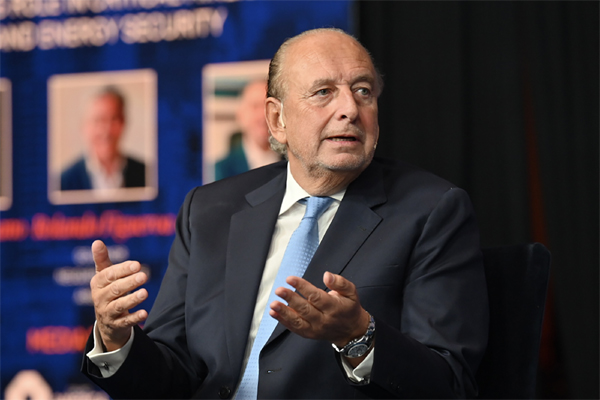
Jonathan Gilbert and Daniel Cancel, Bloomberg News
BUENOS AIRES
EnergiesNet.com 05 21 2024
Over three decades, Jose Luis Manzano built a reputation for diving into distressed sectors in Argentina and navigating tumultuous economic and political cycles to shape a portfolio ranging from media to energy.
Now, through holding company Integra Capital, he’s going all in on mining in a gambit that South American minerals will be essential to fueling the world’s future — and especially the transition to clean power. Argentina, traditionally a farming and oil nation, has more recently been luring investors to its vast, underdeveloped lithium and copper resources.
Manzano has been snapping up mines and lithium-rich acreage in northern Argentina as well as tapping neighboring Brazil’s lithium valley. Late last year, Integra also fended off rival bidders, such as billionaire Eduardo Eurnekian, to restart a huge potash-fertilizer project abandoned by Vale SA in Manzano’s native province of Mendoza, better known for Malbec wines.
“We believe we are positioning ourselves in things that will be necessary for the next 50 to 100 years,” Manzano said in a rare interview from London.
His latest move was buying Peruvian miner Volcan Cia Minera SAA from Glencore Plc.
The 68-year-old physician was a minister under former President Carlos Menem in the early 1990s before entering the business world with a TV company.
Manzano now lives in Geneva and cited that as key to doing deals with Swiss commodity powerhouses like Glencore. Besides two mining projects acquired from Glencore, he’s partnered with Mercuria Energy Group Ltd. in Argentina’s burgeoning shale oil patch and in natural gas distributor Metrogas SA.
But Manzano is now largely looking beyond fossil fuels. An example came last week as he diluted his interest in the shale blocks. Any new ventures outside of mining will instead focus on cleaner energy.
For now, Manzano is working to get the mining projects up to full speed. “We are recruiting people every day,” he said. “There’s no shortage of qualified people in Argentina. I’m very enthusiastic because they’ve been waiting for Argentina to become a mining country, and now they see the opportunity.”
Mining isn’t just a way for Manzano to wager on the changing energy landscape. The Mendoza project for potash — a key ingredient in fertilizers used for crops — can also help satisfy the appetite of a growing global population. “Food security will not happen without potash,” he said.
That acquisition with a Brazilian partner demonstrated Manzano’s flair for contrarian investing, given the current worldwide glut of the crop nutrient. He’s often bought when everyone else is heading for the exits. Vale ditched the project a decade ago because of the tough business climate in Argentina under a leftist government.
President Milei
The nation has now leapt to the other end of the political spectrum with President Javier Milei, a libertarian in his first year in power.
Manzano has long been adept at surfing Argentina’s inflationary spikes, sovereign-debt defaults and money-flow restrictions. Under the Milei administration, he and other business leaders see opportunities to grow their personal wealth and solidify their legacies.
Milei is seeking to pare back the role of government, deregulate the economy, and unshackle business from a slew of controls to attract investment and create private-sector jobs. His signature legislation currently snaking its way through congress also includes sweeping tax and currency benefits for investors from big industries like mining.
Manzano, who’s traditionally been close to the Peronist party that Milei defeated in last year’s elections, is pleased with what he’s seen so far.
“I am optimistic,” he said. “We believe the initial action against inflation is succeeding and that maybe the economy can start on a growth path in the fourth quarter — and that is attracting a lot of attention to the play in Argentina.”
One deal that’s already working out well under Milei — who’s been hiking Argentina’s cheap utility and transport prices — is the controlling stake that Manzano bought with partners more than three years ago in Buenos Aires electricity distributor Edenor SA. New York-traded shares of Edenor have jumped more than 400% since the takeover was announced.

“First off, he’s an extremely intelligent person; that’s something his friends and enemies will recognize. Second, he knows how to move in the halls of power,” said Jose Manuel Ortega, a former Banco Santander SA banker who’s invested in Mendoza and interacted with Manzano. “He’s been able to get capital from investors and partners to do these deals, and obviously that’s helping him build his personal fortune.”
Still, Manzano’s pivot to mining doesn’t come without challenges in Argentina, where the industry pales in comparison to neighboring Chile and has struggled to convince communities that economic benefits outweigh environmental risks.
Elsewhere, not all of Manzano’s deals have panned out. A stake in a venture with Venezuela’s state-run oil company Petroleos de Venezuela SA is producing just a fraction of its capacity. And shares of Interoil Exploration and Production ASA, a Norwegian company in which Integra has a small stake, have cratered this year.
Manzano said the Venezuelan project should ramp up output in coming years, and that problems in Colombian drilling areas that are holding back Interoil would get resolved.
When Manzano eventually steps aside, he may tap legal confidant Nicolas Mallo Huergo, 54, who holds key positions in Integra’s mining and energy companies. When asked about a successor, Manzano put Mallo Huergo’s name on the short list.
“He’s very involved in all the M&A, and the running and oversight of the companies,” Manzano said.
bloomberg,com 05 20 2024











